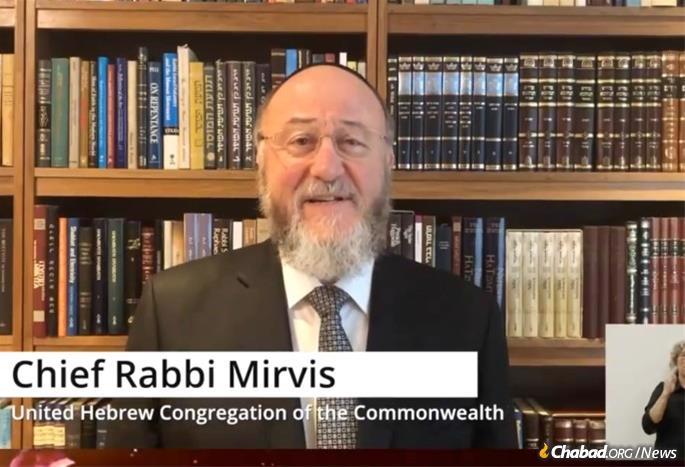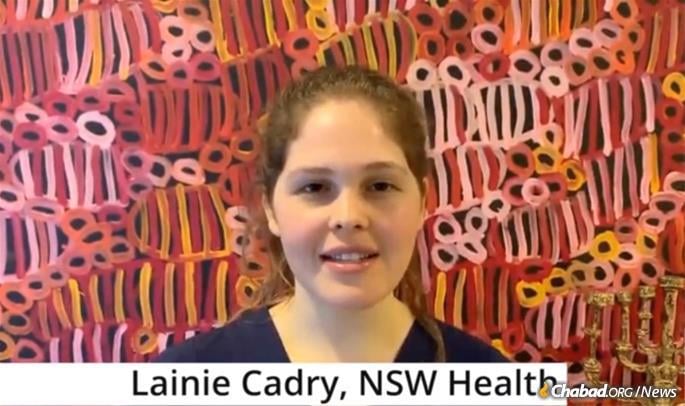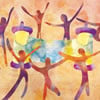After last Yom Kippur, as the community members of Chabad of Auckland, New Zealand, gathered together to break the fast, one congregant rose, telling those gathered: “If it weren’t for Chabad, I wouldn’t have been at synagogue today. I would have been at work.” Another remarked that while he’d been going to synagogue for 83 years, this year’s service was better than all the others combined.
Fast-forward seven months and one coronavirus pandemic later to Lag BaOmer. With the approach of the holiday, which is traditionally celebrated outdoors—a gorgeous time of year in New Zealand, with the warmer weather stubbornly clinging on, and the trees beginning to shed their red and orange leaves—Rabbi Mendel Hecht, director of Chabad of Auckland, was determined to celebrate with the community, social-distancing-style.
While encouraging everyone to stay in their own backyards for kosher Kiwi barbecues and roasted marshmallows, the young rabbi—who arrived with his wife, Esther, to far-flung New Zealand just a year-and-a-half ago, their young daughter in tow—and the Auckland Jewish community took part in a first-ever trans-Tasman Lag BaOmer celebration at the start of the holiday on Monday evening, May 11, with their Australian counterparts across the ditch.
As with every Shabbat and Jewish holiday, New Zealand Jews have the privilege of being the very first Jewish community in the world to usher in the holiness of the day.
“Lag BaOmer is a time for unity,” notes Hecht. “It’s when a plague that killed 24,000 of Rabbi Akiva’s students came to an end. The Talmud explains that this was due to discord among the students—each one unwilling to respect his fellow students’ interpretation of Rabbi Akiva’s teachings. It’s fitting that we came together with a broad section of the regional Jewish community on this day.”
Unity was certainly in the air as more than 200 Jewish communal organizations across Australia and New Zealand came together for “18 for 18,” an 18-minute virtual Lag BaOmer gathering with more than 18,000 Jews tuning in from both countries. Participants were entertained by live musical performances and heard remarks from Jewish leaders and community figures from around the globe, including British Chief Rabbi Ephraim Mirvis; Chief Rabbi of Russia Berel Lazar and the Australian treasurer, the Hon. Josh Frydenberg—the second highest-ranking official in the Australian government and a proud Melbourne Jew.

“While we can’t be together in person this year, we can still celebrate this day of unity together in spirit,” Frydenberg told the thousands tuning in on social media. “It’s so special that even during these times of social distancing, that 18,000 Jewish people from across that Tasman can come together for 18 minutes on the 18th of Iyar. Lag BaOmer is traditionally a time for self-improvement, reflection and acting with extra ahavat Yisrael. As we deal with the COVID-19 crisis, it’s more important than ever that we show extra consideration and kindness as we support each other through these challenging and uncertain times.”
Speaking from New Zealand, 16-year-old Gilad Raisun, who recently returned from studying at Chabad’s Yeshiva Tiferes Bachurim, in Morristown, N.J., proudly reported to the viewers: “I recently started wearing my tefillin, as well as wearing my kippah to school, because I’m a proud Jew!”
Chief Rabbi of the United Hebrew Congregations and the Commonwealth Ephraim Mirvis passionately described how notwithstanding the closure of synagogues worldwide, the Jewish people have soldiered on. “We have proven that Jewish communities go well beyond our buildings—in fact, our communities are all about people!”

‘This Is the New Normal’
The participation of the Auckland Jewish community in the binational event is another sign of the Hechts’ growing role. Upon their arrival last year, they rented a small suburban apartment to serve as their home and a base for Chabad’s activities, certain it would provide sufficient space for their operations over the next few years before they’d have to find someplace larger. The young couple couldn’t have known that their arrival would be such a boost to the Auckland community that only a year after moving down under, they’d need to look for larger accommodations.
The Shabbat before Purim, the Hechts held a minyan at their home, as they do every week, but this one was celebrating the birth of their second child. An overflow crowd crammed their small prayer space. By the next week, however, the coronavirus pandemic had hit New Zealand’s shores, upending their moving plans and suspending in-person services for the foreseeable future.
Like other Chabad centers the world over, they turned to virtual programming, with offerings for adults, teens and children, even bringing their growing Hebrew school online. “We had always been connecting with Jews living in New Zealand’s remote cities and towns by phone and online,” Hecht tells Chabad.org, “but for Auckland, this is the new normal.”
The rabbi sees a silver lining to the otherwise gray fog of the pandemic. “Absence makes the heart grow fonder,” he observes. “People are becoming closer to their faith and cannot wait to go back to shul.”
In Auckland, the Hechts have their eyes towards the future. They credit their success to the Rebbe, Rabbi Menachem M. Schneerson, of righteous memory, whose influence is felt in a special way on Lag BaOmer. The holiday has gained much popularity in recent years, largely due to the efforts of the Rebbe to promote grand parades of Jewish pride.
They also cite the support of Rabbi Moshe Kotlarsky, vice chairman of Merkos L’Inyonei Chinuch, the educational arm of the Chabad-Lubavitch movement, and the guidance of Rabbi Moshe Gutnick of the Sydney Beth Din, in establishing their new Chabad center.
The Hechts will soon relocate to a spacious new premises and have plans to bring new Jewish educational opportunities to Auckland. One important goal they’re working towards is the construction of a state-of-the-art spa-like mikvah, enabling observance of this foundational mitzvah in the most comfortable and luxurious environment.
When the Hechts arrived, one of the families they became acquainted with early on was Russell and Rivka Thomas, and their two young boys. “We helped them set up and built them an aron kodesh (‘holy ark’ that houses the Torah scroll),” says Russell Thomas. “Chabad has given us a fresh way to restart our involvement in Jewish life. Our almost-13-year-old son Julian was due to have his bar mitzvah with the entire family in Israel, which was canceled due to the pandemic.”

Hecht stepped in and helped the family arrange a local celebration while preparing the bar mitzvah boy for his big day. “We’re enjoying Chabad immensely,” adds Russell. Their eldest, Julian, recited one of the 12 Torah passages on the program.
“When we lived in London, we kept Shabbat and kosher,” says David Apfel, who moved to Auckland some nine years ago, explaining that while the United Kingdom offered a wealth of Jewish resources, Auckland had scant opportunities, and the local synagogue was too far to walk to on Shabbat. “Coming here, we lost some of that; certain things fell by the wayside. The Hechts coming brought us closer; they’ve enriched our lives. What they do comes from the heart.”
Gilad Raisun’s mom, Aviva, is proud of her son and her community for arranging the “18 for 18” event locally. “It’s incredible connecting with people from all over the world; it gives me a little bit of hope that the Jewish people will come through this united. We are never forgotten; we can connect from anywhere in the world. You will never find a Jew left behind anywhere. Never.”








Join the Discussion